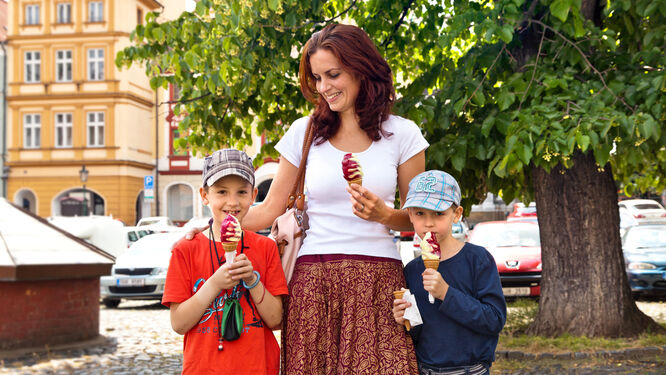Should You Take the Kids to Europe?
By Rick Steves
When parents tell me they're going to Europe and ask me where to take their kids, I'm tempted to answer, "To Grandma and Grandpa's on your way to the airport." Europe is an expensive destination, and taking the kids along changes how you'll experience it — in ways that may surprise you.
All Kidding Aside…
It's easy to make the case against bringing the children: A European vacation with kids in tow is more about playgrounds and petting zoos than world-class art and evocative ruins. No matter your organization skills, you cannot see and do all the things you otherwise would in the same amount of time. With kids in the mix, your best-laid plans are more likely to be derailed — are you prepared to leave the sight you've been waiting a lifetime to see when you sense a meltdown coming on? And while all travel inevitably involves a certain amount of hassle, that amount goes up when you're parenting on the road.
Traveling with kids comes at a price. Out of exhaustion and frustration, you may opt for spendy conveniences like taxis and the first restaurant you find with a kid-friendly menu. Two adults with kids spend twice as much to experience about half the magic of Europe per day than they might without.
If you and your partner have 20 days for a family vacation, are on a budget, and are dreaming of adult time in Europe, consider this plan: Go for 10 days without the kids and really enjoy Europe as adults rather than parents — the savings from leaving them at home will easily cover top-notch child care. Then fly home and spend the other 10 days with your kids — camping, at a water park, or just playing at home. (If your kids have an adult relative somewhere else in the US whom they'd enjoy getting to know better, offer to fly him or her to your house to kid-sit while you're gone.)
All that said, if you can afford it and don't mind accomplishing less as adult sightseers, traveling with your children can be great family fun. Moreover, it's great parenting, as it helps get kids comfortable with the wider world.
With kids, you live more like a European and less like a tourist. Prioritizing neighborhood parks and public swimming pools over tourist-jammed museums and dim churches opens you up to a slower-paced, more locally grounded approach to a foreign culture (and can save you money). Your children become your ambassadors, opening doors to new experiences and relationships. Your child will be your ticket to countless conversations.
Some of your best travel memories may be of your kids floating a wooden boat alongside Parisian enfants in the great pond at Luxembourg Garden or kicking a soccer ball with other niños at a park in Madrid. Let them race their new Italian friends around Siena's main square, the Campo, while you sip your Campari.
And lucky for you, European families enjoy traveling, too. You'll find kids' menus, hotel playrooms, and kids-go-crazy zones at freeway rest stops all over Europe. Parents with a babe-in-arms will generally be offered a seat on crowded buses and sometimes ushered to the front of the line at museums.
What's the Right Age for Europe?
My children are adults now. But after taking them to Europe every year for their first 20 years, it's fun to think back about our European trips during their childhood. When they were grade-schoolers, our trips were consumed with basic survival issues, such as eating, sleeping, and occupying their attention. By the time they entered their teens, the big challenge became making our trips educational and fun.
Some parents won't take their kids abroad until they are old enough to truly enjoy the trip. My rule of thumb is that children should be able to stand a day of walking, be ready to eat what's in front of them, and be comfortable sleeping in strange beds. They should be able to carry their own day packs with some clothes, a journal, and a couple of toys. I've found that children are ready for an international trip at about the same age they're ready for a long day at Disneyland.
Grade-school kids are often the easiest travelers, provided you schedule some kid-friendly activities every day. They're happiest staying in rural places with swimming pools and grassy fields to run around in, or in small towns where the crowds, chaos, and must-see sights are manageable.
Tweens and teens feel that summer break is a vacation they've earned. If this European trip is not their trip, you become the enemy. Make it their trip, too, by asking for their help. Kids can quickly get excited about a vacation if they're involved in the planning stages. Give each kid a location to research. Consider your teen's suggestions and make real concessions. Spending some time in cities is essential, and a day of shopping or at the beach could be more fun than another ruined abbey.
If you'd rather remove the stress of planning and have some energy to enjoy adult company, consider taking your kids on an organized tour designed for families. For example, my company's family tours and "My Way" unguided tours welcome kids as young as 8; at 12, they can accompany their parents on any Rick Steves tour.) Especially in summer, kids tend to find friends in the group, leaving parents free to relax with other adults.

